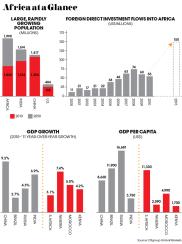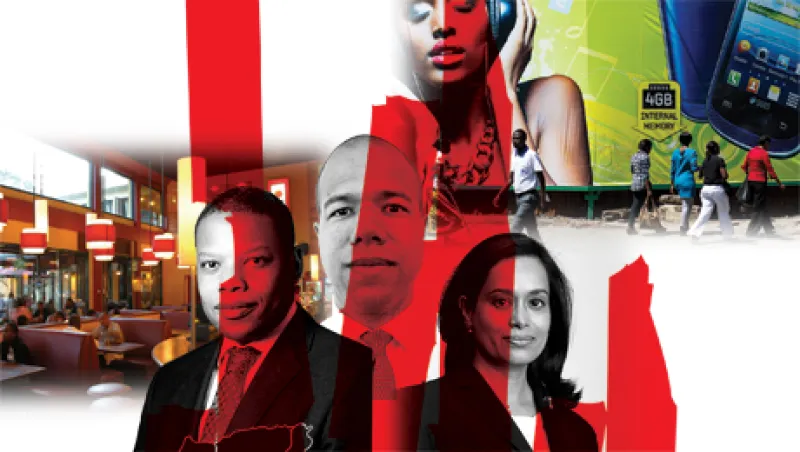WHEN THE HEAVYWEIGHTS OF the global private equity industry gathered in Berlin in February 2012 for the annual SuperReturn conference, they were treated to an unusual performance. Sir Bob Geldof, the Boomtown Rats–vocalist-turned-Africa-evangelist, paraded on the stage of the InterContinental hotel ballroom, appealing to the hearts — and wallets — of the deal makers and investors who packed the room. A generation ago Geldof organized the 1985 Live Aid concert to raise money for famine victims in Ethiopia, memorably demanding in a live BBC television interview that viewers “give us your f***ing money!” Time hasn’t diminished his passion, but it has sharpened his focus. Sporting what he called his best Gordon Gekko shirt, Geldof delivered an hourlong talk peppered with expletives at the Berlin conference, explaining that 8 Miles, a private equity group he chairs, had raised $200 million for investment in Africa just that month.
“I have learned that private equity, contrary to the Romney-esque debate in the United States at the moment, can be a major vehicle for positive change in this world,” Geldof told the crowd.
One year later such positive change is as tantalizing as it is tangible. Private equity investors are eyeing Africa more intently than ever, with big global firms such as Carlyle Group and KKR & Co. boosting their presence on the continent alongside smaller regional players like Helios Investment Partners and Development Partners International. Deal flow remains far below the peak hit in 2007, though, and well behind the ambitions of most major players. Investors complain of too many buyers chasing too few opportunities, leading to excessive valuations. More recently, an insurrection by Muslim militants in Mali and an attack on an Algerian oil refinery by terrorists linked to the Taliban have heightened investor concerns about political risk.
“Straight after the events suitors’ sensitivity to risk in Africa went up, and that always brings down valuations,” says Miguel Azevedo, Citigroup’s head of investment banking in Africa. “Buyers said they want to take this risk only if it is economically very attractive.”
Difficulties encountered by some major companies recently have underscored the political risks of investing in certain parts of Africa.
Anglo-Australian mining company Rio Tinto stunned shareholders in January when it wrote off $3 billion of the $4 billion it had spent to acquire Riversdale Mining, an Australian company with coal interests in southern Africa, in April 2011. Rio Tinto took the write-down after the Mozambique government rejected its plan to ship coal down the Zambezi River by barge on environmental grounds, forcing the company to consider more-costly rail transportation. The move, which prompted the firing of CEO Tom Albanese, served as a cautionary reminder that unpredictable government intervention and inadequate infrastructure can undermine otherwise promising investments.
Yet Africa’s attractions are real, and private equity industry executives remain confident that the region will generate more business over the medium term. The political and economic environment has improved dramatically in many parts of the continent over the past decade. The International Monetary Fund forecasts that 28 of 45 sub-Saharan African countries will post economic growth rates of 5 percent or more this year. The continent’s population is expected to nearly double, to almost 2 billion people, by 2050. Conditions are ripe for a dramatic growth of the region’s middle class, which the African Development Bank estimates at 123 million people.
“Our view is that the African story is one of growth, of improving political stability but not complete stability, so one has to have a very careful and very clear strategy,” says Marlon Chigwende, co-head of Carlyle’s Sub-Saharan Africa Fund, which is expected to be $500 million when fundraising closes. “The specific situations of Mali or Algeria have not altered my view that over the next ten to 15 years, if you choose correctly, sub-Saharan Africa is still one of the most attractive places in the world.”
Washington-based Carlyle made its first foray into the region in November 2012, when it led a $210 million minority investment in Export Trading Group, a Tanzania-based company that deals in agricultural commodities such as rice, maize and cashew nuts. It was the biggest private equity deal ever done in East Africa. Carlyle did not disclose its share of the deal, but it was the largest of three investors; the others were the private equity arm of Standard Chartered bank and the Pembani Remgro Infrastructure Fund, an investment vehicle controlled by Johann Rupert, chairman of luxury goods company Cie. Financière Richemont, and Phuthuma Nhleko, a former CEO of mobile phone company MTN Group.
Carlyle, which has a separate $500 million Middle East and North Africa fund, is not the only big beast of the private equity world on the prowl in Africa. KKR lured Kayode Akinola from Helios late last year to lead its hunt for African deals. The firm doesn’t have a dedicated African fund and hasn’t done any deals yet but can draw on its $6 billion European buyout fund for African investments.
“The way we are looking at the market is with measured caution. Africa needs a balanced perspective,” says Akinola. “There are, of course, headwinds in Africa. But by the same token, there is a huge amount of opportunity.” Akinola says he has talked with a number of entrepreneurs. Some are hungry for capital, while others are looking for operational experience or trading links with KKR-backed companies elsewhere in the world, but the firm is in no hurry to spend money.
In part, the caution of firms like KKR reflects a wariness of repeating the boom-bust pattern of recent years. Africa experienced a surge in deal making over the past decade. Activity hit a notable peak when Bain Capital acquired Edcon Holdings, a listed South African apparel retailer, for 25 billion rand ($3.5 billion) in a U.S.-style leveraged buyout in 2007. It looked like a surefire play on the country’s growing consumer market, but the global financial crisis that followed the collapse of Lehman Brothers Holdings in 2008 hit South Africa hard, pushing the economy into recession and causing Edcon’s sales to tumble as consumer spending tanked.

The company has since bounced back. Earnings before interest, taxes, depreciation and amortization hit R4.04 billion last year, 30 percent above the level of 2007. Still, Bain had to sell off Edcon’s consumer credit arm to Absa Bank for $1.2 billion earlier this year to reduce some of the $2.6 billion in debt it took on to finance the acquisition. What’s more, the firm hasn’t done another deal in Africa since Edcon.
Private equity deal volume rose 10 percent last year, to $1.2 billion, but that was just a fraction of the $3.4 billion peak hit in 2007, and it amounted to only a sliver of the $23.7 billion that private equity firms invested across emerging-markets economies worldwide in 2012, according to the Emerging Markets Private Equity Association. The association includes only equity investment in its figures, not the debt portion of buyout deals.
There is plenty of money pursuing deals, but only modest amounts are being committed. Helios, an Africa-focused firm founded by former TPG Capital executives, closed its second fund — at $900 million, almost three times the size of its first fund — in June 2011. The firm, which aims to return three times its invested capital, hoped the newer fund would allow it to make larger investments. In February 2011, Helios teamed up with Dutch energy trading firm Vitol Group to buy Royal Dutch Shell’s downstream assets in 14 African countries for $1 billion. Last year the firm paid $62 million for a 29.4 percent stake in Eland Oil & Gas, a Scottish company that produces oil in Nigeria, and took a two-year option to buy an additional 5 percent for $16 million.
Such chunky deals are relatively rare, however. Of the 61 private equity transactions conducted in sub-Saharan Africa last year, only ten were worth $75 million or more, according to the African Venture Capital Association.
Some investors worry that there is an excessive amount of money chasing a small number of companies. “For large sweet-spot consumer deals, there is a lot of appetite and a lot of competition. The question is whether there are enough deals,” says Dushy Sivanithy, principal and Africa expert at Pantheon Ventures (UK), a $24 billion fund-of-funds private equity group based in London.
With firms like Carlyle and KKR arriving and others moving up in deal size, competition for the few large transactions available is stiffer than ever. Sellers of those businesses are not unschooled in the ways of M&A and are shopping their companies through local and international investment banks, which in turn can mean higher prices.
“There are more auctions, it is getting pricier, but there are many other companies outside the auction processes,” says Runa Alam, chief executive and co-founder of Development Partners International, a London-based firm that focuses exclusively on Africa. DPI, which launched its first fund in 2008, has fully invested that $350 million in nine companies and is now looking to do larger deals.
Other players say they are not worried about the potential for larger deals. “There is increasing competition, but it is still nowhere near the competition of the U.S., Europe or other emerging markets,” says Carlyle’s Chigwende. His firm estimates that on a GDP-adjusted basis, there is seven times as much capital chasing deals in China, 4.5 times as much in India and 3.5 times as much in Brazil.
In March, in the wake of Carlyle’s investment in Export Trading Group, the firm’s investment committee approved a second sub-Saharan Africa investment that will mean writing a check for more than $50 million, Chigwende says. He is also working on a potential third transaction that if completed would mean that the firm will have committed a sizable chunk of the fund before it is even closed.
THE DISTINGUISHING FEAture of African private equity is growth, not leverage. Most investors seek to tap into the region’s small but fast-growing companies and provide them with capital to expand rather than using borrowed money to juice returns.
That was the rationale when Emerging Capital Partners bought Nairobi Java House last year; the firm didn’t disclose the terms of the investment, but they did not involve any debt. The company operates the largest casual dining chain in East Africa, serving mostly coffee, hamburgers and burritos, but it’s tiny by Western standards. At the time of the deal, it had only 14 restaurants, mainly in the Kenyan capital, and annual revenue of about 1 billion Kenyan shillings ($11.7 million). But ECP executives believe the market is primed to take off.
“It’s not like the market was significantly fragmented — at 14 we were the biggest by a factor of four,” says ECP co-founder Bryce Fort. “It’s just that in this market people had yet to roll out branded restaurant retail.” In the first eight months of owning the business, ECP has grown the number of restaurants to 22. Fort believes Nairobi Java House has the potential to multiply that number several times by expanding into major cities across East Africa.
Larger companies also are experiencing strong growth. Revenue for Export Trading Group was growing at 20 percent a year when Carlyle invested. With the new capital going straight onto the balance sheet, the agricultural group, which already employs 7,000 people across 30 African nations, plans to strengthen its hold in the prime rice-growing lands centered in Ghana, in West Africa. It also intends to try to squeeze more value out of one of its largest product lines, cashews. Raw cashews sell for about $90 a ton, but processed nuts can fetch four or five times that price and require little capital outlay.
Finding ways to boost margins without cutting costs and focusing on sales growth rather than earnings contrast with many private equity deals in the West, which often rely on operational efficiencies or leverage to generate returns. “I like to track the number of widgets,” says Davinder Sikand, head of Africa for Dubai-based buyout firm Abraaj Group. “Tell me about the tons of cement we have produced and sold; tell me about the number of microfinance customers we have or how many loans are out there. Just focus on the growth in the underlying business, keep your costs under control, and your whole business will grow.”
Abraaj has stepped up its activity in Africa in part through the 2012 acquisition of Aureos Capital, a firm that invests in small and medium-size enterprises in Africa and Latin America. Abraaj has made 56 investments across sub-Saharan Africa.
Unleveraged investments can generate a lot of cash, which can be plowed back into a company to fuel more growth or be paid out in dividends. DPI invested its $350 million fund in companies ranging from banks to pharmaceuticals businesses to makers of prefabricated buildings. The firm paid an average of 4.5 times earnings, a modest multiple by the standard of most emerging-markets deals. DPI has already returned about $50 million to its limited partners purely from cash flows, rather than relying on stake sales or debt to finance dividends.
Opportunities are abundant at the smaller end of the scale, but completing deals in that segment of the market can be complicated. Jacana Partners, founded in 2008 by a group of four British entrepreneurs, investors and philanthropists, focuses on investments of $1 million to $5 million in small companies in East and West Africa. The firm, which operates out of offices in London, Nairobi and Accra, Ghana, has looked at some 400 companies in the past 18 months. Only a fraction of them are ready for investment, and small companies typically require more hand-holding and managerial help than larger companies, says CEO Simon Merchant. After considering more than 300 Ghanaian companies, Jacana is in the process of finalizing just two deals, he adds.
Taking equity stakes in companies is not the only way to invest in Africa, though. Jacana is raising a $75 million fund that will be able to invest in mezzanine debt as well as equity. “We have found that the way to generate attractive risk-adjusted returns in the SME space is to use mezzanine and quasiequity structures,” Merchant says. “We are clear that we are taking equity risk always. What we are trying to do is price equity risk with a mezzanine instrument.” Cash-starved entrepreneurs may not want to sell a stake or may not understand the concept of private equity, but they are happy to borrow money when it comes with the benefit of management experience that a private equity investor can provide, the CEO adds.
Fusion Investment Management, a private investment firm focused on East Africa with $100 million under management, has also successfully taken the debt route. The firm has made some 270 investments since its launch six years ago; the vast majority involve working capital loans for small and midsize companies. Fusion has also invested in a new office property project in Nairobi, providing $6 million in equity and a $4 million senior secured loan with a market rate coupon of 16 percent.
“We talked to a few people and took the view we could do the senior debt ourselves,” says the group’s chairman, Phil Goodwin. “There is a shortage of capital, they are underbanked, so you can make mezzanine-style returns by investing in senior secured debt.”
LARGER INVESTORS ARE being drawn to Africa by appealing returns and the maturing of the private equity industry, which offers second- and third-generation funds. London-based emerging-markets specialist Actis estimates that there are as many as 500 potential new investors eyeing Africa. Hard data to help such investors make decisions has been sketchy, however, with the most reliable figures coming from the international financial institutions that backed many of the funds the first time around.
International Finance Corp., the World Bank Group’s private sector investment arm, says its 31 private equity fund investments in Africa, which include stakes in Aureos, ECP and Helios, have delivered annualized returns of 17.8 percent since 2000.
The African Venture Capital Association has established a new, broader 40-fund benchmark, reflecting investments in more than 350 businesses. This index, developed with U.S. investment consulting firm Cambridge Associates, shows that Africa-focused private equity has delivered annualized returns of 11.2 percent for the ten years through last September.
AVCA chief executive Michelle Essomé says her association gets frequent calls from Western foundations, endowments and funds of funds seeking detailed information about the African market. “People are still in the R&D phase,” she says. “They are gathering research, trying to understand the landscape and who the top players are.”
That interest is showing up in the numbers. Fundraising for private equity firms in sub-Saharan Africa increased by 9 percent last year, to $1.4 billion. That was well short of the industry’s peak year of 2008, when firms raised a total of $2.2 billion, but the trend is definitely on the upswing. Funds with an Africa focus raised $1.6 billion in the first quarter of 2013, $300 million more than emerging Asia funds, according to Palico, a Paris-based outfit that helps connect limited partners with private equity firms and facilitates secondary transactions. The firm estimates that some $4 billion of new capital will be raised this year for Africa.
Others are skeptical that investor appetite will grow so fast. “People are taking meetings and are showing a real interest, but it’s not necessarily translating into commitments yet,” says Pantheon’s Sivanithy, who has made more than half a dozen trips to Africa over the past 12 months. His firm first invested in Africa in 1999 through a fund he declines to name but which he says has returned more than three times Pantheon’s investment. The firm ultimately wants to have three or four trusted managers on the continent. “The manager universe is getting more interesting, but it’s still quite a young market for private equity, and there are no prizes for going too early,” Sivanithy adds.
Private equity firms aren’t alone in showing increased interest in Africa. Multinational corporations are expanding their presence on the continent. Major mining and oil companies have been active for years, seeking to develop the region’s abundant natural resources. More recently, consumer-oriented companies, including brewers, cosmetics makers and retailers, have been investing in Africa, hoping the continent will serve as a tonic to offset stagnant demand in more-mature markets.
Wal-Mart Stores, the world’s largest retailer, spent $2.4 billion to acquire Massmart Holdings, a Johannesburg-based retailer, in 2011. The U.S. company wanted to tap into Massmart’s rapidly expanding regional operations; the company currently has outlets in 14 African countries and plans to open stores in Kenya. Diageo, the world’s biggest alcoholic beverage group, already a force in Nigeria, spent $225 million last year to buy Meta Abo Brewery in Ethiopia.
For private equity firms and the African companies and entrepreneurs they back, such investments by global giants represent both an opportunity and a threat. Carlyle has positioned itself to do larger deals that it hopes to eventually sell to strategic buyers. From that perspective the appetite of companies like Wal-Mart is encouraging. But big corporations are also moving into markets with smaller green-field investments, and their financial and marketing heft have the potential to overwhelm local competitors. Procter & Gamble Co. recently opened a $27 million soap factory outside Lagos, Nigeria, and French cosmetics and personal care products maker L’Oréal, which has flirted with acquisitions in Kenya, plans to increase its African sales by 10 to 20 percent a year. That threat may be enough to drive entrepreneurs to sell out to strategic buyers, not the private equity groups, some bankers and industry executives say.
It’s not just Western corporations that have been targeting Africa. Chinese enterprises have invested heavily — bilateral trade between China and Africa was $198 billion last year — and they are often supported by China’s own private equity offering: The China-Africa Development Fund, set up in 2006 with $1 billion in capital, was designed to help Chinese groups invest on the continent. In 2010 it partnered with Chinese cement maker Jidong Development Group Co. to build a $220 million cement plant in South Africa, and it has put money into a power plant in Ghana and cotton farms in Malawi and Mozambique.
China underscored its interest in Africa in March when President Xi Jinping visited Tanzania, the Republic of the Congo and South Africa on his first foreign trip after taking office.
Indian companies are also active in Africa. In 2010, Bharti Airtel paid $9 billion to acquire the African mobile telephone operations of Kuwait’s Zain after twice failing to buy South African telecom giant MTN Group. The latter company has expanded its own operations into 21 countries across Africa and the Middle East.
Selling out to a strategic buyer is not the only exit option for private equity investors. Last year Actis sold a 38 percent stake in Umeme, Uganda’s electric utility, through a $66 million initial public offering on the Kampala stock exchange, which valued the company at about $165 million. It was the country’s largest-ever IPO, and late last month Umeme shares were trading 14 percent above the IPO price at 314 Ugandan shillings (12.6 cents).
“With optimism — and optimism is always present when talking about Africa — I think there is room for significant improvement in using the market for an exit route,” says Citigroup’s Azevedo.
Such IPOs remain the exception rather than the rule. Africa has more than 20 stock exchanges, but with the exception of Johannesburg and Cairo, most are small and relatively illiquid. As local capital markets grow in size and sophistication, they will become another key factor supporting the development of private equity across the continent.
“The thing people sometimes forget is, Africa is 54 countries as opposed to one, with different governments and regulatory regimes in each, and while there are similarities, it is fragmented,” says ECP’s Fort. “That being said, the scale of the opportunity, if you know how to address it, is every bit as big as the other emerging markets.”






